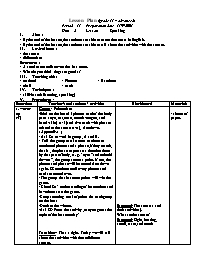Giáo án môn Tiếng Anh 11 - Unit: 1 Lesson: listening - Period 11: Preparation

I. Aims :
- By the end of the lesson, the students are able to name the senses in English.
- By the end of the lesson, the students are able to talk about the activities with the senses.
II. Lexical items :
- the senses
- differentiate
Structures :
- A smoke sensor discovers fire in a room.
- What do you think dogs are good at?
III. Teaching aids:
- textbook - Pictures - Handouts
- chalk - cards
Bạn đang xem tài liệu "Giáo án môn Tiếng Anh 11 - Unit: 1 Lesson: listening - Period 11: Preparation", để tải tài liệu gốc về máy bạn click vào nút DOWNLOAD ở trên
Lesson Plan (grade 11 – advanced) Period : 11 Preparation date : 17/9/2007 Unit : 2 Lesson : Speaking Aims : - By the end of the lesson, the students are able to name the senses in English. - By the end of the lesson, the students are able to talk about the activities with the senses. Lexical items : - the senses - differentiate Structures : - A smoke sensor discovers fire in a room. - What do you think dogs are good at? Teaching aids: - textbook - Pictures - Handouts - chalk - cards Techniques : - skill-based ( listening, speaking) Procedures : State/time Teacher’s and students’ activities Blackboard Materials 1. warm-up (4’) Games: Pelmanism -Stick on the board 5 picture card of the body parts ( eye, ear, nose, mouth /tongue, and hand /skin ) (1-5 )and five cards with phrases related to the senses (a-e ), face down. ( Appendix1 ) - Ask Sts to work in group , A and B. - Tell the group to take turns to choose a numbered picture and a phrase, if they match, that is , the phrase expresses a function done by that part of body, e . g. “eyes” and colorful flowers”, the group scores 1 point. If not, the picture and phrase will be turned face down again. SS continue until every picture and card are turned over. - The group that has more points will win the game. - Check Sts’ understanding of instructions and have them start the game. -Keep a running total of points for each group on the boar -Declare the winner. -Ask SS: From the activity ,can you guess the topic of the lesson today? Transition:- That ‘s right. Today we will talk about the activities with these different senses. -Write down on the board : Expected: The senses ( and their activities). What are the senses? Expected: Sight, hearing, smell, taste, and touch Unit 2 : Speaking - sheets of paper. 2. Pre- Speaking (5’) Matching pictures with activities ( task a, p.28-29) - Ask Sts to read the phrases in Task a and match them with the pictures. - Tell SS to compare answers in pairs and then go over the answers with the whole class. -Check if SS know what a smoke sensor is. Give explanations. -Ask SS what ‘ differentiate’ means. Expected: ‘distinguish’ Chalk and board Textbook 3. while-Speaking. (15’) Activity 1: Talking about activities with the senses (Task b, p.29) - Tell Sts to work in pairs, ask and answer about the things and people mentioned in task a and their ability. - Go around to monitor and note down errors if any for correction later. -Encourage SS to talk about other animals or things that have a good sense of any . Or you may want to list a few for SS to talk about . (For example: cats , owls,). -Call on some close and open pairs to act out their conversations. Activity 2: ‘Spin the top’ - Prepare 5 or 6 five – sided cards with the words eyes , ear, nose, tongue, and hand on each side. ( Appendix2 ) - Ask SS to work in 5 0r 6 groups. -Give each group a card and a pointed pencil ( or something similar) -Tell SS to pierce the pencil thought the middle of the card. -In turn , each student in the groups spins the top and makes a sentence about what they do with the sense corresponding to the picture where it lands . For the second round, SS talk about the animals or things that are very good at the senses. -Demonstrate by spinning the top and make a sentence to so SS what they are expected to do. For example , the top lands at the nose ,the sentence can be ‘ I can smell food , fragrance of flowers ,etc.’ for the second round, it can be :’Dogs are good at smelling.’ -have SS start the activity. -Go around to monitor and note down errors if any for correction later. -Give feedback and comments. Textbook Personal experience cards 4. Post-Speaking (15’) Listening and recognsing: - Ask SS to work in two groups , A and B , listen to your sentences and name the sense implied in each sentence . - if the group can’t get it right , the other group take the turn and score points if they get it right. - Keep the running total of points for each group on the board. - Declare the winner and then give feedback and comments. The sentences used in the activity are: 1.I don’t like the fragrance of this flower . 2.This juice is a bit too sour for me. 3.this table feels tough. 4.The house is small but very nice. 5.We love classic music. 6.Do you like sweet soup? 7.It’s so quiet in here. 8.The water is too cold to swim. Handouts 5. Homework (1’) Sentence Making - Ask Sts to make a few sentences about activities with the senses. . textbook
Tài liệu đính kèm:
 p11.doc
p11.doc





